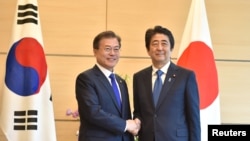With 2018 coming to a close, court cases brought by forced laborers in South Korea against Japan and the closing of a fund meant to assist aging victims of Japanese forced sexual slavery during World War II, have contributed to the souring of bilateral relations between Seoul and Tokyo.
Sejong University professor Yuji Hosaka tells VOA that the reason for the oscillating ties between the two countries is because of a conflation of the past and present.
"As president Moon [Jae-in] said the two-track policy which separates the history and current issues (like trade). Japan should do the same," he said.
Grant Newsham, a senior research fellow with the Japan Forum for Strategic Studies in Tokyo, proposes a different theory.
"The Japanese bring out the worst in the Koreans," he said.
Newsham said there is a deep resentment over how the Japanese treated Koreans during the 1910 - 1945 period when Tokyo controlled the peninsula.
He added, "unfortunately" there's resentment at the political level and an inability to let "bygones be bygones," which continues to affect bilateral ties, even though many other Asian countries have been able to move past the events that took place under Japanese forces during the Second World War.
Forced labor rulings
In October and November, South Korea's top court, in multiple cases brought by South Koreans against Japan's Nippon Steel & Sumitomo Metal Corp. and Mitsubishi Heavy Industries regarding wartime forced labor, ordered the Japanese companies to pay compensation to the plaintiffs.
At the recent Asia-Pacific Economic Cooperation summit, Japanese Prime Minister Shinzo Abe and South Korean President Moon Jae-in shook hands and exchanged greetings, but the pair had no formal talks, with Abe calling the ruling "unthinkable in light of international law."
In addition, following the ruling, Japanese Foreign Minister Taro Kono called the ruling extremely regrettable and that it overturned the friendly ties between South Korea and Japan.
Newsham doesn't agree with Kono's statement and sees the current relationship between Seoul and Tokyo as continuing an existing pattern.
"So you look at what actually goes on between the two countries... economically, tourist-wise, militarily...It doesn't really change all that much. But it's not as good as it should be. Particularly on the military front," Newsham said.
He said the relationship between Seoul and Tokyo has never been completely frozen, but that at "a certain level, they're yelling at each other."
"The Koreans are yelling at the Japanese and the Japanese are doing their best to bite their lip...and sometimes they have to say something," Newsham said. "And that's how I look at Japan's response to the court ruling… there is just immense frustration on the Japanese side."
Reparations completely and finally resolved?
Friday, Moon called the issues related to the "comfort women" and forced laborers a "violation of human rights caused by colonization (of Japan)."
"Korea and Japan should work together to restore the honor and dignity of the victims," Moon said.
Tokyo continues to argue that reparations and damages to the plaintiffs run contrary to the 1965 Treaty on Basic Relations between Japan and the Republic of Korea, the document that agreement formally re-established diplomatic ties between the two countries.
Clause 1 of Article II of the treaty reads, "The contracting parties confirm that the problem concerning properties, rights and interests of the two contracting parties and their nationals, including juridical persons, and concerning claims between the contracting parties and their nationals, including those provided for in Article IV, paragraph (a) of the Treaty of Peace with Japan signed in the city of San Francisco on September 8, 1951, is settled completely and finally."
South Korea contends the clause does not cover calls for reparations by "comfort women" or laborers forced to work during World War II and that these issues, and others, have not been settled.
The debate over the merits of that argument continues to chip away at fostering better ties between South Korea and Japan, although Japanese Liberal Democratic party member Fukushiro Nukaga said that the issue of individual claims needs to be addressed by both countries, according to an official text message from the South Korean presidential office.
Newsham doesn't see much support in the Japanese Diet for having continued deliberations with Seoul about the topic.
"The Koreans have managed to antagonize… even people who would like to somehow work something out… I just don't see any calls for Japan to put this to rest, because people think Japan has," he said.
Hosaka added the "two sides should meet more often and discuss further ways to find the right solution." He says high-level meetings or a summit between Moon and Abe would be prudent.
Moving forward
As the year comes to a close, Newsham sees the current ebb and flow of ties between Seoul and Tokyo continuing for the foreseeable future, regardless of which political party in South Korea occupies the Presidential Blue House.
"I think [the bilateral relationship] will be... a frosty one for a good long time," he says but, "it's not as if people in both countries just despise each other. In fact, on an individual level, they get along very well."
But Hosake pins Seoul-Tokyo ties to the advancement of the inter-Korean relationship and Washington's relationship with Pyongyang.
"There is a big chance that the South Korean--Japanese relationship progresses dramatically upon the surrounding those circumstances," he said, "We need to focus on this aspect more."












